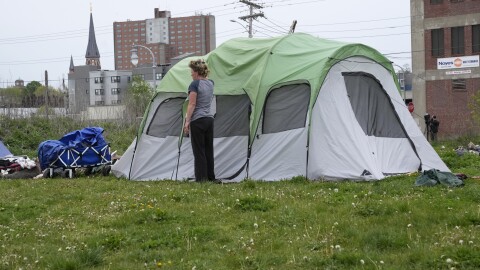Gov. Janet Mills is calling on the Trump administration to reverse course on a series of policy changes that would gut federal funding for homeless services in Maine.
The new policy, announced by the U.S. Department of Housing and Urban Development last week, will cap funding for permanent supportive housing and rapid rehousing services, effectively cutting the state's federal funds for those programs by two-thirds.
State officials now estimate that as a result, about 1,200 people could lose their long-term housing and risk becoming homeless.
At a press conference Monday, Mills said the federal cuts will burden general assistance and strain local communities. The state of Maine likely cannot fill the gap, she added.
"This new directive from the Trump administration is callous," Mills said. "It is cruel, and it is unnecessary."
Mainers throughout the state rely on permanent supportive housing or rapid rehousing services, state officials said Maine. The policy changes will impact more than 200 people in Portland, though Mills emphasized that Mainers in urban and rural parts of Maine are in long-term, stable housing through these services.
More than 300 people in the Bangor region are utilizing these programs, the most of any other part of Maine, said Jen Gunderman, executive director of Bangor Public Health and Community Services. Many are older, or have a disability or complex health issue. Bangor is at the center of an HIV outbreak, the largest in the state.
"I have also seen firsthand how housing supported by this federal funding has been a lifeline for people," Gunderman said. "With stable housing and wraparound services like HIV case management, mental health support and substance use treatment, many people are staying engaged in medical care."
Mills said she's been in contact with the congressional delegation about the policy changes. Maine's attorney general is also considering legal action.




